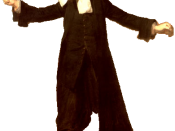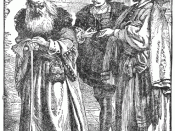Christians are superior to Jews." Such was the attitude of the Elizabethan audiences. This audience saw Shylock as the villain, because, according to them, evil was an inherent trait of a Jew. In order to make all the negative traits of Shylock the Jew more apparent, Shakespeare created a contrast. Antonio, who is meant to contrast Shylock, is used to make the Jew's flaws more obvious to the Elizabethans.
When Shylock and Antonio meet, their words of confrontation show how each is nearly the opposite of his fellow. To highlight the Jew's stinginess, Shakespeare has the two protagonists argue about it. Shylock prides himself on his thrift, while in the gentile world it was most probably, as it is today, looked down upon. Antonio, in contrast, prides himself on having an open wallet. Antonio spares no expense for his friend Bassanio's happiness, even his life, he would willfully give.
Also, this caring for a friend contrasts Shylock's sentiments. Shylock didn't care about his daughter after she betrayed him, but only wanted his possessions to be returned. Furthermore, the kind Antonio is happy, while the angry Shylock only becomes more bitter as the play progresses. Both happiness and being free with one's money were looked upon as positive things in Elizabethan times. Both traits were obviously portrayed by Antonio the Christian, while Shylock was the owner of the opposite characteristics, frowned upon in those times.
Kindness is another virtue in the book embodied by Antonio. While Shylock's love of money or ambition preclude any such kindness, Antonio is a charitable man. Antonio helps those in need of a loan, lending money free of interest. Thus, he would attract borrowers, giving them an alternative to borrowing ducats at Shylock`s astronomical interest rates. Because he is so amiable,


